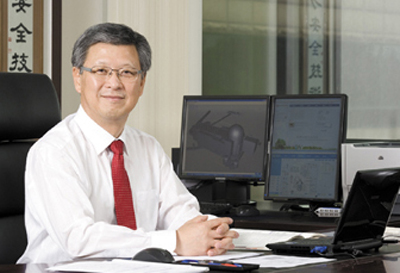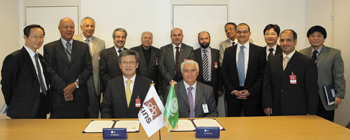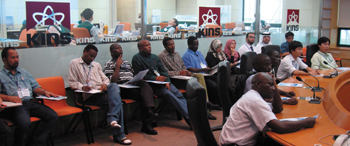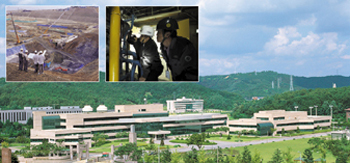KINS, a Center for Global Nuclear Safety
Guides the establishment of nuclear safety networks in 50 countries in the Middle East, Africa and Asia
 The Korea Institute for Nuclear Safety (KINS) signed MOUs with the Forum of Nuclear Regulatory Bodies in Africa (FNRBA) and the Arab Atomic Energy Agency (AAES) on Sept. 23 on the sidelines of the 54th IAEA (International Atomic Energy Agency) General Conference in Vienna and began a project to provide support for the establishment of nuclear safety regulation infrastructure.
The Korea Institute for Nuclear Safety (KINS) signed MOUs with the Forum of Nuclear Regulatory Bodies in Africa (FNRBA) and the Arab Atomic Energy Agency (AAES) on Sept. 23 on the sidelines of the 54th IAEA (International Atomic Energy Agency) General Conference in Vienna and began a project to provide support for the establishment of nuclear safety regulation infrastructure.
The agreements were reached in accordance with the FNRBA and the IAEA¡¯s request to promote collaboration with KINS to receive support for the establishment of advanced nuclear safety regulation infrastructure. Under the MOUs, KINS will carry out a package of technical support for the establishment of regulatory infrastructure including information exchanges, the dispatching of experts and the holding of related conferences with a focus on educational programs in the nuclear safety field.
The signing of the MOUs with 50 countries in the Middle East and Africa was owed to KINS¡¯s strenuous efforts to build advanced regulation infrastructure ¡ª laws and regulations/regulatory systems, the establishment of regulatory institutions, the development of regulatory human resources and the nurturing of expert technological capacity ¡ª for the safe use of nuclear energy over the past 30 years.
In particular, entering the 2000s, Korea has been recognized as a technology-donor country in the international community and has requested to transfer technology to developing nuclear power countries. KINS developed the Integrated Regulatory Infrastructure Support Service (IRSS) even before Korea was awarded a deal to export nuclear power units by the United Arab Emirates.
IRSS is an international consulting service for establishing a user-friendly nuclear regulatory infrastructure as a package of nuclear regulatory support for each country that wants to introduce nuclear energy. It is a module-type regulatory support tool combining KINS¡¯s experiences and I-based technology conforming to IAEA safety standards.
The IAEA stresses the proper establishment of safety infrastructure and consistent improvements in order to ensure safe nuclear power generation. Most first-time nuclear energy importing countries are requested to establish their own nuclear regulatory infrastructure, including the strengthening of their regulatory staffs¡¯ capacity and the assessment of safety and regulatory technology through partnerships with nuclear energy exporting countries as recommended by the international community.
Human resources development is a key part of technological self-reliance. For Korea, the international community¡¯s consistent support for the development of human resources laid the foundation for technological self-reliance, so the nation may be the representative recipient of the IAEA¡¯s project to provide technological support for enhancing its member countries¡¯ capacities.
Recognizing the rationale that Korea has to provide support to other countries¡¯ human resources development and share the expertise and experiences it has accumulated in order to improve the safety of the global nuclear energy industry, KINS has been aggressively conducting contributing activities.
The International Nuclear Safety School (INSS), established by KINS in 2005, has been offering balanced, quality expertise education on nuclear safety to trainees from the Middle East, Africa and Asia. KINS has operated the International Nuclear Safety Master¡¯s Degree Program since 2009. The opening of the nuclear safety expertise manpower development program, which lasts one year and six months, was designed to take into account Korea¡¯s past experiences as an emerging nuclear energy country and the manpower resources development programs KINS¡¯s experts received from advanced nuclear energy countries, which were a little bit insufficient. The manpower development program, which is tailored to reflect Korea¡¯s experiences, has gained popularity as illustrated by the number of applicants surging to 40, double the quota.
KINS is a nuclear energy safety regulation expert organization responsible for ensuring the safety of not only all processes of nuclear power plants, including the designation of nuclear power unit sites, design, manufacturing, construction, operation and decommissioning, but also that of 4,000 radioisotope users, including general hospitals across the nation and nondestructive testing companies.
KINS is also responsible for conducting real-time monitoring and assessment of radioactivity levels throughout the country to prevent radiation disasters, including nuclear tests and nuclear power unit accidents in neighboring countries.
KINS, dubbing itself ¡°The Guard of Nuclear Safety,¡± is committed to ensuring nuclear safety by enhancing its technology and capacity so that people can feel at ease while working toward reshaping itself into a nuclear safety regulation expert organization to lead global nuclear safety. nw
KINS President Yun Choul-ho
The Korea Institute for Nuclear Safety signed MOUs with 50 member countries of FNBRA and AAES during the 54th IAEA General Conference in Vienna on Sept. 23.
Foreign students attend a class at the International Nuclear Safety School.
A general view of the Korea Institute for Nuclear Safety. (inset) KINS officials conduct safety checks.
3Fl, 292-47, Shindang 6-dong, Chung-gu, Seoul, Korea 100-456
Tel : 82-2-2235-6114 / Fax : 82-2-2235-0799